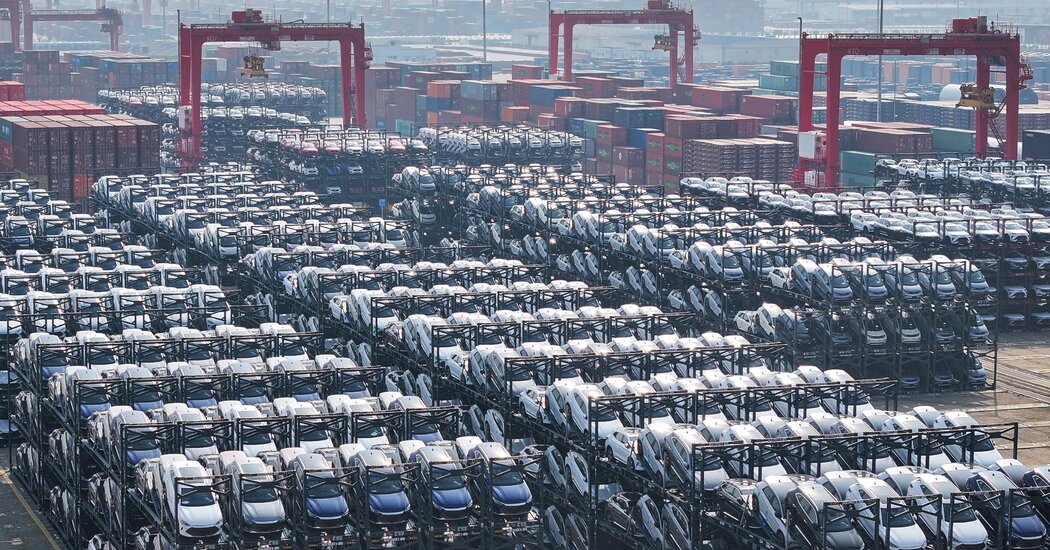The European Union on Thursday took the next step in imposing new tariffs on Chinese electric cars, requiring carmakers to get guarantees from banks that they would be able to pay the taxes, which will be finalized in October.
The move was expected. The bloc had said on June 12 that it would impose additional tariffs of 17 to 38 percent on electric vehicles imported from China. A European Union investigation had uncovered what officials in Brussels described as unfair Chinese government subsidies for electric carmakers.
The Chinese government denies it subsidizes the industry. Beijing argues that low prices for electric cars made in China reflect fierce competition and innovation.
The two sides began talks on June 22 to try to resolve the dispute. “We continue to work intensively with China to find a mutually acceptable solution,” said EU Trade Commissioner Valdis Dombrovskis.
To impose provisional tariffs, carmakers must provide European countries with financial guarantees for the final payment, but they do not yet have to send any money.
The preliminary tariffs vary significantly by automaker, based on the European Union’s estimates of the size of each Chinese manufacturer’s government subsidies. The highest tariffs are imposed on manufacturers that have disclosed little about their subsidies, including a 37.6 percent tariff on SAIC Motor. Lower tariffs apply to BYD, at 17.4 percent, and Geely, at 19.9 percent.
Carmakers must guarantee they can pay for vehicles arriving in the European Union from Friday for a period running until October. However, the bloc must still determine in the coming months whether subsidies for Chinese cars have caused significant damage to the European car market.
There are concerns among governments around the world that China is trying to export its way out of economic troubles, as a housing market crash has made Chinese households less willing to spend. In May, President Biden quadrupled U.S. tariffs on Chinese electric vehicles to 100 percent.
Turkey last month imposed an additional 40 percent tariff on gasoline-powered and gasoline-electric hybrid cars imported from China. Turkey had already imposed additional tariffs on Chinese electric cars last year. On Tuesday, Canada began a trade investigation that could also lead to tariffs on electric cars from China.
Brazil will gradually increase tariffs on electric cars starting this month, regardless of which country they are imported from, after imports from China surged earlier this year.
China has threatened retaliatory measures against the European Union. The Commerce Department said on June 17 that it had launched an investigation into whether pork from the European Union was being dumped in China at unfairly low prices. The case could lead to tariffs on dozens of products, from pork chops to pickled pig intestines.
In January, the Commerce Department launched a trade case against imports of cognac and other European wine-based spirits, which come mainly from France. The French government was an early supporter of tariffs on electric cars from China.
China's auto industry has proposed that the ministry impose tariffs on large gasoline-powered cars imported from the European Union if the bloc imposes tariffs on electric cars. China has imposed a 40 percent sales tax on cars and SUVs with very large gasoline engines, almost all of which are imported from North America or Europe.
China also has a base tariff of 15 percent on imported cars. Europe has a base tariff of 10 percent on cars, and the United States has a tariff of 2.5 percent. The various tariffs that are now being set or imposed are in addition to these base tariffs.
China is returning to the playbook it followed during its last major trade dispute with the European Union, in 2013 over China’s low-priced shipments of solar panels to Europe. At the time, Beijing convinced Germany to lead a coalition of EU member states that blocked tariffs on solar panels.
But it could be harder for China to stop the tariffs on electric vehicles. Europe’s solar industry was decimated a decade ago after the union withdrew its tariffs. Few in Europe want to see electric car manufacturing suffer a similar fate.
The European Union has also tightened its rules for countries to roll back tariffs. China would need to win a majority of member states in a final vote in October, and those countries would need to represent at least 65 percent of the bloc’s population.
Member states will also hold a preliminary vote in two weeks on whether to back the provisional tariffs. But the vote is not binding on the European Commission, the bloc's executive body.
Chinese automakers are starting to build factories in Europe to meet demand and avoid tariffs, in a strategy developed by Japanese automakers to circumvent trade restrictions in the United States. “It's like what Toyota did in the 1980s,” said John Zeng, an analyst at GlobalData Automotive.
But China has a surplus of auto factories at home, with the capacity to build twice as many cars as are sold in China, which is the world's largest auto market.
The trade case has led to a split in the European auto industry. German carmakers oppose the tariffs. They are facing sharply declining sales in China, as Chinese carmakers have gained market share at their expense. So German carmakers are increasingly exporting from their factories in China, including to Europe.
However, auto parts makers in Europe are more likely to support imposing tariffs, as major carmakers such as Volkswagen increasingly assemble cars using parts produced by Chinese companies.

